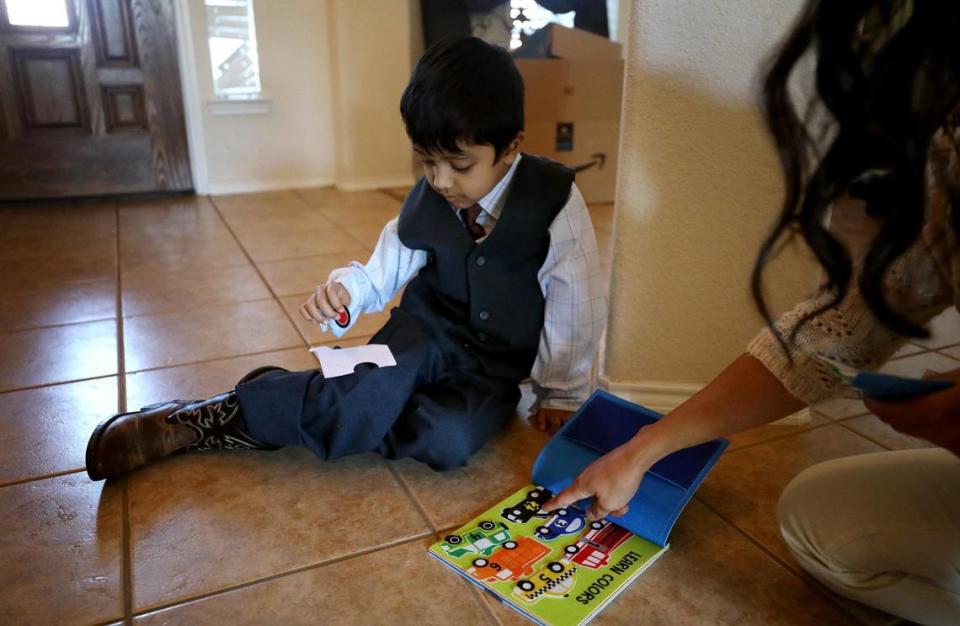There’s help for kids with developmental disabilities, but families face these roadblocks
At nearly 3 years old, Kenneth Moses spoke fewer than 10 words and didn’t chew his food.
A pediatrician suggested that Kenneth’s parents have him screened for autism. Hudson Moses, Kenneth’s father, told the Fort Worth Star-Telegram the family knew little about autism and was in disbelief leading up to a diagnosis.
“That was a very long wait,” Moses said. “By that time, we realized we needed to educate ourselves on what’s going on, what milestones are and where he should be.”
Experts say early screenings and referrals for services are keys to a better future for children with delays or disabilities. Such services can help with development, behavior and emotions and result in the child being better prepared for kindergarten.
But many Texas children face barriers to accessing services, such as screenings or even a state-funded Early Childhood Intervention program. Families may be held back by fear, lack of health insurance, or financial and housing instability. The COVID-19 pandemic has also caused barriers to service.

Forty-six percent of Texas children ages 9 months to 35 months received a developmental screening, according to 2018-2019 data from the Anne E. Casey Foundation. The Centers for Disease Control and Prevention recommend that all children should have a developmental screening and formal test even if there are no concerns.
While pediatricians are able to help families with concerns on child development, continuous health care can be a challenge for some families. Dr. Christina Robinson, medical director at the University of North Texas Health Science Center’s pediatric mobile clinic, has noticed patients facing multiple barriers to care.
The mobile clinic works to help families living in underserved communities in Tarrant County by traveling to schools, community centers and organizations. Some families may have language barriers, are unemployed or have suddenly lost medical benefits.
“We have noticed that there is usually not just one barrier, but layers of barriers our families are struggling with,” Robinson said. “When one barrier may not exist one time, the next time you see them another barrier might be there when the other one hasn’t resolved.”
Barriers facing families
At the Pediatric Mobile Clinic, Robinson remembers seeing a 2-year-old who wasn’t maintaining eye contact and was not verbal. The mother thought the behavior was normal because the child was young.
“I’ve seen parents who came in with concern and have been concerned for a while. Some of their concerns have been not heard, even though they have brought them up with others,” Robinson said. “I’ve also seen children where they thought what was happening with their child was normal.”
When a family with a young child visits the Pediatric Mobile Clinic, they are met with a doctor and a Healthy Steps specialist. The team conducts screenings to understand developmental delays, social determinants of health and possible adverse childhood experiences. They have meetings with families to educate them on issues and direct them to services, such as those available through the Early Childhood Intervention program.
Healthy Steps, a national program, works to address childhood development by partnering with pediatricians. The program has specialists working with doctors at the Pediatric Mobile Clinic, JPS Pediatric Clinic and Cook Children’s specialty clinics. The organization found that even if children visit a pediatrician, many across the U.S. may not have access to resources or services.
“Families with children at moderate to high risk of developmental delays may actually receive less family-centered care, referrals, and care coordination, potentially indicating that a systemic bias exists or that providers can be overwhelmed by certain children’s needs,” Healthy Steps stated in a 2019 report. “Pediatricians acknowledge this limited coordination and its negative effect on families’ ability to access services, attributing it primarily to lack of time and inadequate staffing.”
Julia Marut, a Healthy Steps specialist, said the team approach at the Pediatric Mobile Clinic allows for a smooth transition in the referral process for additional services.
Housing instability a factor
Housing instability has created a barrier for many children. There are 14,981 children in Tarrant County experiencing homelessness, according to a report by the Center for Transforming Lives. The organization helps women and children experiencing financial and housing insecurity.
The organization stated that out of the 14,981 children who are estimated to be experiencing homelessness there are 7,400 children who are under the age of 6. Only 15% of children in Texas who experience homelessness live in a shelter, while the rest live with families in vehicles, hotels or temporarily staying with other people.
Carrie Pearson, director of child and family services at the Center for Transforming Lives, said a child’s brain has the most growth in development during the first few years of life. She said it can be difficult to provide help to families that are experiencing homelessness and who don’t live in shelters.
“Children’s brains are developing at a fast rate,” Pearson said. “When we can provide intervention during those stages we have seen children who are so much more prepared for kindergarten.”
Some children in the organization’s childcare programs have speech and language delays, emotional and behavioral issues, or frequent absences. Pearson said families are taught about milestones through family advocates, teachers and guest speakers.
Pearson said 100% of the 4- and 5-year-olds in the organization’s pre-K programs are kindergarten-ready when leaving.
“If they are not kindergarten-ready, then that cycle just continues and children get further and further behind,” she said. “They experience more depression, anxiety, withdrawals, aggression and emotional problems.”
Early Childhood Intervention in Texas
Early Childhood Intervention is a state funded program that provides services to families and children with developmental delays and disabilities. The Individuals with Disabilities Education Act grants young children, starting at birth, the right to the services they need.
In Texas, children qualify for the Early Childhood Intervention program if they are 3-years-old or younger, have received a medical diagnosis, have an auditory or visual condition, or a developmental delay. Early Childhood Intervention is able to provide a variety of services including occupational therapy, counseling, speech and language therapy, and nutrition and feeding.
There were 79,252 children In Texas who referred to Early Childhood Intervention programs in 2020, according to Texas Health and Human Services Commission data. The agency’s 2019 data reported there were 5,447 children served through its programs in Tarrant County.
The state’s Early Childhood Intervention program underwent a federal investigation that concluded in 2020. The US Department of Education determined that not all of the young children eligible for the agency’s programs were provided services, according to an Oct. 2020 letter sent to the Texas Health and Human Services Commission.
Texans Care for Children, a policy organization, stated in a 2020 report that the state program overall was under-enrolling infants and toddlers across the state, and disparities were seen among children of color.
“In 2018, Texas [Early Childhood Intervention] served 2.34 percent of children under age three, compared to the national average of 3.74 percent, ranking the state 46th in the nation,” the Texans Care for Children report stated. “While Texas [Early Childhood Intervention] enrollment is low for children of all backgrounds, it is disproportionately low for Black children.”
Peter Clark, communications director for Texans Care for Children, said Early Childhood Intervention has faced funding cuts over the years.
“There have been a lot of challenges related to [Early Childhood Intervention], ‘‘ Clark said. “But at the end of the day, when [Early Childhood Intervention] has the funding it needs, these groups are really effective at helping kids learn to walk, communicate with their families and meet other developmental goals.”
Finding a support system
The Moses family saw an advertisement at their son’s school highlighting an event hosted by Help Me Grow North Texas. The event was “very significant” for Kenneth, who has autism. His family went from only having the advice of their pediatrician to being connected with several services that helped Kenneth.
As immigrants from India, Help Me Grow provided the Moses family a support system that helped them address their son’s needs.
“There is this whole big family that we found,” Hudson Moses said. “It was very positive. They didn’t treat us like strangers.”
Help Me Grow North Texas provides families a centralized access point to community resources. Fifty community partners, like My Health My Resources of Tarrant County (MHMR), help the free initiative provide services to families. MHMR also connects families to Early Childhood Intervention services and oversees local Healthy Steps specialists.

When families connect with Help Me Grow, a case worker reviews their needs and goes through social determinants of health. Social determinants of health are things that can affect a person’s health and quality of life and involve things such as housing, transportation, education and the environment. Developmental screenings are able to be done online or in-person at a family’s home.
The initiative served 3,300 caregivers and families of children 0-6 and completed 2,300 developmental screenings in 2021. It saw an increase in requests during the summer and performs about 500 referrals each month.
Lisa Hencke, a family navigator at Help Me Grow North Texas, said a developmental screening looks at five areas: communication, gross and fine motor skills and personal, social and emotional development. The screenings are age-specific and check to see if a child is hitting certain milestones.
Hencke remembers a mother calling the program after noticing another child at a playground using more words than her own child. The initiative was able to do a developmental screening and connect the child to Early Childhood Intervention.
“We’re here to help them navigate through all of the different resources that are out in the community,” Hencke. “We are able to narrow down what is best going to fit their needs.”
Help Me Grow educated the Moses family about different therapies that were available to Kenneth, such as applied behavior analysis, music and occupational therapies. The family became connected with other parents who have children with autism.
Kenneth, now 4-years-old, earned a certificate stating he was the most improved in his class, which came with a report on his behavior.
“He’s improved in ways that we never imagined,” Hudson Moses said.
The father said asking for help as soon as possible is important, “Every day matters. Every week matters.”
Resources:
Help Me Grow: 844-689-5437
Pediatric Mobile Clinic: 817-929-5437
My Health My Resources of Tarrant County: 817-335-3022
Center for Transforming Lives: 817-332-6191

 Yahoo Movies
Yahoo Movies 
